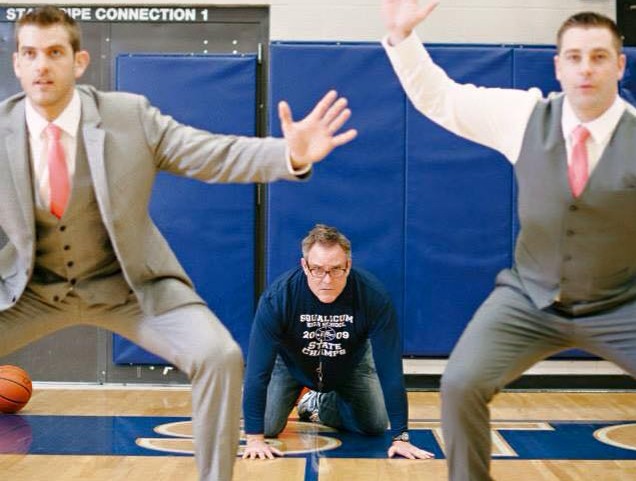When my dad was in college he called his father (my grandfather) who had recently started what was a publically traded bank at the time and dad said, “dad, I know what I want to do with my life… I want to be a teacher and a basketball coach!” Dad had an opportunity to be involved in a very successful business and instead decided to pursue a career in teaching and coaching because he believed that it was RIGHT THERE, where he could make the greatest impact in this world. Then I was born…
Almost every childhood memory is in a gym. My siblings and I were homeschooled until we got to high school and I can remember waking up with dad’s alarm in order to get my day started, 5:30 seemed like a good time to begin the studies in order to be done by lunch time. What was the point of being done by lunch time you might ask? Well, if my brother and I completed our school work, mom would drop us off at dad’s practice and we would watch my dad on his hands and knees on the baseline watching his players feet, making sure that they did the little things right. The gym is a magical place and for our family it served as the place for late night family games, birthday parties, Thanksgiving hoops, we lived in the gym. Some kids have pro athletes that they look up to, but my brother and I looked up to dad’s high school players and would ask every away game for the chance that we might get to ride the bus with dad and his team. Dad made it a priority (even though I’m sure it took more work on his part) for us to be with him, at practice, on the bus, in the locker room, sweeping the floor, lowering the curtain, organizing uniforms, the list goes on and on. We were invited in to be a part!
“…becoming a GREAT coach happens when you turn the corner, rearrange your ledger lines from Ws and Ls being connected to the score board and seeing your success being tied to the number of weddings that you are getting invited to.”
Dad was recently inducted into the coach’s hall of fame in the state of Washington and has made a HUGE impact on the lives of young people, many of which are dads, coaches, leaders in their community. If dad isn’t coaching, you can probably find him in his brown arm chair correcting test, watching game film or spending time with his wife, kids or grandkids.
 If you are a coach, don’t coach for YOU. At some point you will start coaching for the KIDS alone, but why not start now. Dad tells of his coaching journey, how that was the case with him as well as so many coaches. Every coach feels the need to prove themselves, which is natural and also what makes them a great coach, they are competitors. BUT, becoming a GREAT coach happens when you turn the corner, rearrange your ledger lines from Ws and Ls being connected to the score board and seeing your success being tied to the number of weddings that you are getting invited to. When we reevaluate time and score we start truly making a difference.
If you are a coach, don’t coach for YOU. At some point you will start coaching for the KIDS alone, but why not start now. Dad tells of his coaching journey, how that was the case with him as well as so many coaches. Every coach feels the need to prove themselves, which is natural and also what makes them a great coach, they are competitors. BUT, becoming a GREAT coach happens when you turn the corner, rearrange your ledger lines from Ws and Ls being connected to the score board and seeing your success being tied to the number of weddings that you are getting invited to. When we reevaluate time and score we start truly making a difference.
Finally, if you are a coach and you have kids… don’t neglect them as your first calling. Your wife is your first priority and your kids are next in line. Only after those are in order should you begin taking on MORE LIVES to steward. Don’t buy some lie that trading your time with your family is worth it as long as you are impacting the community. This world, parents, administrators, fans, business leaders, other coaches, even your players will pat you on the back and tell you that you are God’s gift to this world, but it is ALLL for nothing if your marriage is falling a part. Grow a pair and get home. Learn to say NO.
I remember when my dad QUIT COACHING, he gave up his head coaching job because I was in 7th grade and he didn’t want to have to coach me at the high school level. He quit and became a fan so that he could be a DAD first. Now THAT is the stuff that makes an impact, obviously… it’s what I’m writing about right now. Coach – make the impact at home. Someday your children may be writing about you and you only get 1 chance.
“becoming a GREAT coach happens when you turn the corner, rearrange your ledger lines from Ws and Ls being connected to the score board and seeing your success being tied to the number of weddings that you are getting invited to.”
Aaron Dickson is from a coach’s family and has been around sport his whole life. He played hoops in college on a full scholarship (where he met his wife also a full ride hooper) and has been training basketball players for the last 10 years. Aaron is passionate about Jesus, his family, sport and discipleship which is why he started Pursuit Sports, a ministry that invites followers of Jesus (who speak sport at a high level) to disciple athletes through skill training. Pursuit Sports is very simple: we train skills for 30 min and do leadership development for 30 min in order to invest in athletes.









 If you are a coach, don’t coach for YOU. At some point you will start coaching for the KIDS alone, but why not start now. Dad tells of his coaching journey, how that was the case with him as well as so many coaches. Every coach feels the need to prove themselves, which is natural and also what makes them a great coach, they are competitors. BUT, becoming a GREAT coach happens when you turn the corner, rearrange your ledger lines from Ws and Ls being connected to the score board and seeing your success being tied to the number of weddings that you are getting invited to. When we reevaluate time and score we start truly making a difference.
If you are a coach, don’t coach for YOU. At some point you will start coaching for the KIDS alone, but why not start now. Dad tells of his coaching journey, how that was the case with him as well as so many coaches. Every coach feels the need to prove themselves, which is natural and also what makes them a great coach, they are competitors. BUT, becoming a GREAT coach happens when you turn the corner, rearrange your ledger lines from Ws and Ls being connected to the score board and seeing your success being tied to the number of weddings that you are getting invited to. When we reevaluate time and score we start truly making a difference.
